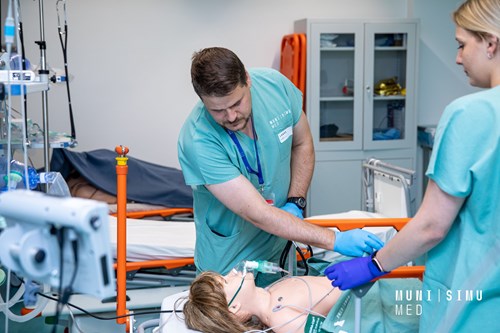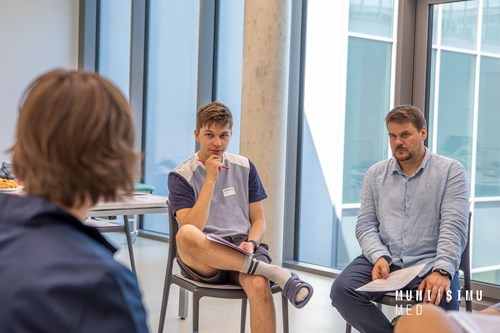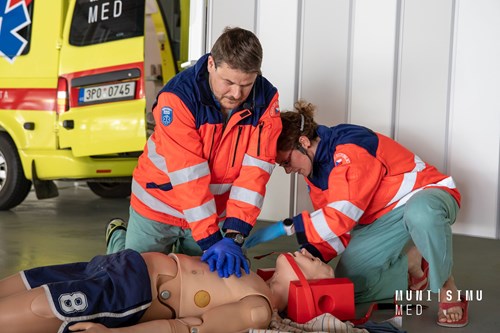In 1000 days of operation of the FM MU Simulation Centre (SIMU), much has been achieved! For example, obtaining SESAM accreditation, organizing nearly a hundred runs of various courses, or filming the groundbreaking episode of Hyde Park Civilization. In 4 semesters, the capacity of the centre has been filled so that 139 courses are taught here, not only for medics, but also for future pharmacists or paramedics. And more subjects are gradually being added. By chance, or in sports terminology "perfect timing", the Deputy Head of the Department of Pediatric Infectious Diseases at the Brno University Hospital, Lukáš Homola, MD, PhD, became exactly the 1000th participant in the postgraduate courses held at SIMU since its opening.
On 17 July, you attended the course Management of Critical Conditions in Paediatrics at SIMU - from your current position as Deputy Head of the KDIN of the Faculty of Medicine of the Medical University of Masaryk University and the University Hospital Brno, you have the issue of the acute paediatric patient on your agenda, so to speak. How was completing this course a challenge for you?
Yes, our clinic is dedicated to acute paediatric patients, including critically ill ones. The main challenge for me on the course was simulating patients with diagnoses that we don't normally encounter (e.g. extensive burns, neonatal CPR). It was a challenge, but actually the biggest benefit.
From the first of September you will be the head of this clinic. First of all, let us congratulate you on your appointment, and then I will ask you how the course you have just completed will affect your and your colleagues' daily practice?
I will definitely recommend the course to all my colleagues as I would love to apply a lot of the communication habits from the course in our workplace.
Do you see simulation medicine as the future of education in your field and do you plan to incorporate simulation in some form into your undergraduate teaching?
We would like to teach part of our infectious medicine training at SIMU. We are currently in the process of discussing which teaching format would be most appropriate for our goals. We already know that we would like to include training in lumbar puncture, which is also taught by neurologists. This would give students more opportunities to review this procedure.
At SIMU you also completed the ABCD course for lecturers. How do you see the benefit of these courses for potential trainees and also for the students who will be in charge of such trained lecturers?
Giving feedback is very important in teaching and at work. So far I have used it in a kind of intuitive way. A major benefit of the ABCD course is the intensive practice of debriefing. I had no idea that debriefing could have a clear structure and tools to make it very easy.
What difference/exceptionality do you observe in the courses held at SIMU LF MU and courses outside SIMU?
I have encountered simulations outside SIMU only minimally in the form of role-playing scenes with a lecturer or when practicing specific skills on models (e.g. bronchoscopy). High-fidelity simulations on SIMU are a completely different experience.
SIMU has become an important entity in the field of both undergraduate and postgraduate teaching. Is there anything you would like to say to those thinking of attending our courses?
I would say "Give it a try!" There are things you can train for at SIMU that even practice doesn't prepare us for.
Thank you for talking to us and thank you to all the course participants for being with us.
SIMU team








